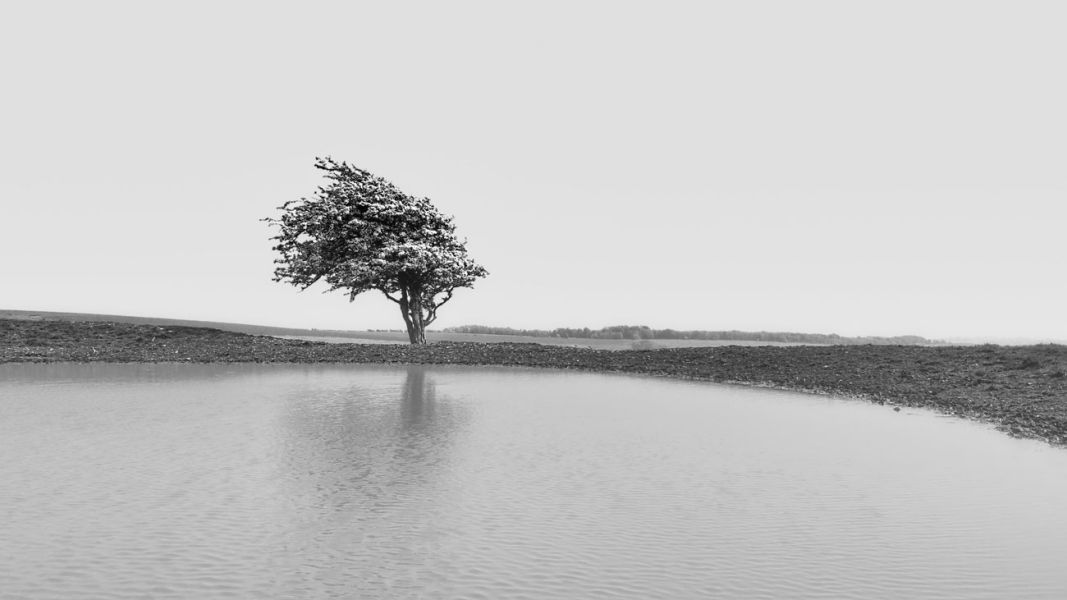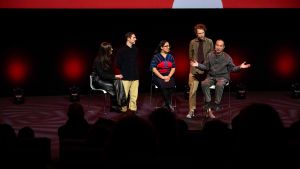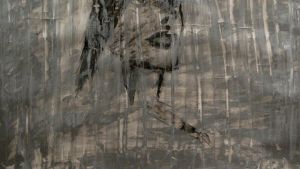
Words Against the Wind: A Conversation with Liu Wai Tong
Liu Wai Tong (廖偉棠) is a poet, writer, and photographer. He was born in 1975 in Guangdong Province, later moved to Hong Kong, lived in Beijing for five years, and currently lives in Taipei. Liu has received the Hong Kong Biennial Award for Literature, the Taiwan Times Literature Award, and the United Daily News Literature Award. He was awarded the 2012 Hong Kong Arts Development Award for Best Artist in the literature category, and is often invited to international literary events, such as the 2011 Taipei Poetry Festival, the 2013 Poetry International in Rotterdam, and the 2016 Singapore Writers Festival. Since his debut, Liu has published more than 10 poetry collections, including Bitter Angels (苦天使), Young Wanderer (少年游), Black Rain is Near (黑雨將至), Wandering Hong Kong with Spirits (和幽靈一起的香港漫遊), Barbarous Night Songs (野蠻夜歌), Eight Inches of Snow (八尺雪意), Half a Notebook of Ghost Talk (半簿鬼語), The Cup of Spring (春盞), and Cherry and Vajra (櫻桃與金剛). Poems cited in this conversation were published in Liu’s 2020 book All Lights Will not Burn Out: Liu Wai Tong Selected Poems 2017–2019 (一切閃耀都不會熄滅:廖偉棠2017–2019詩選) and his 2015 book Umtopia (傘托邦).
Liu’s work also includes a collection of short stories titled War Game in Eighteen Alleys (十八條小巷的戰爭遊戲); collections of prose such as Wearing Flowers Wandering in the Night
(衣錦夜行) and Branches of Feelings (有情枝); photography and writing collections such as We Evacuate Here, Leaving Only the Light (我們從此撤離, 只留下光), Bohemian Hong Kong, Hippy China (波希香港, 嬉皮中國), In Search of Tsangyang Gyatso (尋找倉央嘉措), and My City Gorgeous (我城风流); photo collections like Lonely China (孤獨的中國), Paris: Photos de scène sans titre (巴黎無題劇照), and The Darkening Planet (微暗行星); the photography review collection Travel Notes (遊目記); literary essay collections such as Late at Night Reading a Fictional History of the Universe (深夜讀罷一本虛構的宇宙史) and Heterotopia Guide (異托邦指南); and the music essay collection Against the Grain (反調).
This interview was finalised in 2020 while Liu was in Taiwan and Zeng was in Israel. The Chinese edition was published in the same year in the Autumn issue (no. 31) of Router: A Journal of Cultural Studies.
ZENG Jinyan: You grew up on the Chinese mainland, lived for a long time in Hong Kong, and are now resident artist at Taipei National University of the Arts. You have experienced life in China, Hong Kong, and Taiwan, and have long been responding to social phenomena in your work, interacting with social movements. Can I start by asking about your poem ‘Thirty Years [卅年] (24–28 May 2019)’?
Do you think it is fair to say the memory of 4 June 1989 belongs to Hong Kong and not mainland Chinese people? For mainlanders, who live under constraints on freedom of speech, there is no open discussion or commemoration and so, in the collective memory, the events of June Fourth do not exist. But Hongkongers have, through TV and press coverage, through the annual candlelight vigil at Victoria Park, and through the same songs sung in commemoration every year, come to know about the events of June Fourth. They have internalised the memory of those events, given shape to collective feeling, and developed a separate sense of identity—as Hongkongers who have long had relative freedom of speech, freedom of the press, and rule of law—from mainland Chinese people, who live without freedom of speech. In the poem ‘Thirty Years’, you say: ‘Good night, Hong Kong.’ During the Umbrella Movement in 2014, in ‘Hong Kong Nocturne (29 June 2014)’, you also wrote the same lines. Has Hong Kong been hurt? Is it drifting or alone without help? In your own work, and in contemporary literature, what is Hong Kong? Is Hong Kong a shelter for you?
LIU Wai Tong:
After thirty years of talk
The dead have all finally come south to this city.
After thirty years of rectification
The place where it happens, too, has finally come south to this city.
經過三十年的念叨
死者終於全部南下這個城市。
經過三十年的改造
事發地點也終於南下變成這個城市。
This is the opening to ‘Thirty Years’. Over the past three decades, almost every year I have written a poem for 4 June as a way of remembering. I also use this as a way of writing some reflections on recent developments in China and Hong Kong. This year [2019] is the most direct I have been about expressing the idea that, at least as far as Hongkongers are concerned, June Fourth is no longer just something that happened in 1989 in Beijing. For the past 30 years, not a moment has gone by when it is not casting its light and shadow on Hong Kong. Eventually, it became a part of the spirit of Hong Kong—not just a collective memory, not just a moral obligation, but a continuation of the movement, even a resurgence of the waves, and so it became tied up with Hong Kong’s destiny; there is no longer any avoiding it. To put it another way, June Fourth did not end in 1989 in Beijing. It has become a movement that every person unwilling to forget has chosen to carry on.
When I said good night to Hong Kong twice, five years apart, both times I was also saying ‘take care’. But in this year’s message, there was an added sense of pining hope in Hong Kong—a hope that, on her path of no return, Hong Kong will rub her eyes clear and stride ahead. In my work, Hong Kong is, first, the closest object of experimentation I can get to examine this age; for me, and other Hongkongers, as we experience this tremendous upheaval together, we are demonstrating a kind of deeply unique agency irreplaceable with any other nation’s people, choosing a future. Its vicissitudes, its grassroots, its dignity—are all things I treasure; they are also what gives my work rich nourishment and enduring courage.
As far as the arts are concerned, Hong Kong is not the best place for artists to survive. Aside from freedom of creativity, it has no other advantages. But it is a place suited to the survival of art itself because this place is always so full of energy, of a kind of stirring. The business of a poet always goes on in their mind; it goes on as we walk around and experience the world around us; it is not some concrete business or trade. But Hong Kong has practically no full-time artists. Instead, its artists get a kind of mixed nourishment. In every artist’s ‘part-time’ pursuits, they meet with a unique world, which is much better than shutting themselves away and working with no experience of the world.
In a city like this, a writer’s observations must be different to those of a journalist, a sociologist, or an anthropologist, though they borrow from their methods. Closer to the way I work is a photographer’s intuition, a scientist’s attention to detail, the pain of a person who wanders the city and feels it firsthand. On the one hand, I see myself as a kind of object of experiment, tossing myself into the city, and on the other, I treat myself like a spirit, going in search of other spirits to talk to. In that way, I can raise the spirits of another Hong Kong, and capture them like developing a photograph. Whatever my specific perspective, it is always one fixed on marginalised groups, vulnerable people, whether new immigrant mothers, sex workers, or so-called losers—people who, in a developed society, have been dealt a losing hand. They are all a bridge to reconstruct another Hong Kong, they have been forced to become ‘spirits’.
Another thing to note is that Hong Kong and Macau literature has for many years been marginalised by literature from China’s central plains, but who knew marginalisation became an advantage for these local literatures, helping them to establish themselves? First, there is the decisive influence that local language has on the way a writer thinks. In poetry, this is particularly marked because in writing poems you are directly considering sound, rhyme, and rhythm. Different local languages result in different ways of thinking and different forms of presentation; poets will first consider their mother tongue.
Hong Kong to me, as ‘my city’, has to it a sense of ‘sharing in adversity’. If Hong Kong were to have just kept on doing great, I do not think I would have identified with it so strongly. But when it met with distress, that is when I realised that we shared a kind of affinity in our troubles. There is no one place that can become a poet’s ‘shelter’, and I am sure I am set to keep on wandering. It may look like I am moving around because of an objective need, but behind it there is something powerful in my subconscious that is directing me: at heart, I have this longing to become a nomad, a Bohemian. For now, humans are not able to travel in time, so I do my best to travel through space. Every city I have lived in has integrated a part of itself into my poems. Just like Du Fu yearned to travel, in the process of movement, you can come as close as possible to experiencing different destinies; whatever the destiny, for a poet, it is good.
ZJY: I found it interesting to read ‘In Praise of Objects (2 January 2014)’ and ‘Words Against the Wind (1 August 2019)’ together. These two poems instantly take us to the 2014 Umbrella Movement and the scenes that unfolded in the black-clothed protests against China’s extradition bill in 2019. They give such a full picture and yet the feeling evoked by each detail is just so inexplicably on-point; this is writing that comes right from the soul of the protestors. In both 2014 and 2019, you spent time at the scenes of the protests and took a lot of photographs. Can I ask you to talk about what changes had taken place, in terms of aesthetics, between the forms of expression at the scenes of Hong Kong’s 2019 protests and those of the protests in 2014?
LWT: The 2014 protests always had some sense of Utopian imagination about them, which is one of the reasons I named a book Umtopia (傘托邦). The street aesthetics tended a bit towards the romantic side. This sense of romanticism has carried on until now, and it remains the greatest sense of comfort that the streets give to those taking action together. Of course, there is now [2019] more of the confrontational material, and there are also more large-scale systematic forms of artistic expression; this reflects the maturity and the stronger will of the protesters. Besides that, a lot of the work five years ago was done by the more sentimental writers who were throwing themselves, all guns blazing, into these war proclamation–type writings, as if they could not help but strive to become heroes.
Coming back to my own poems, if, in 2014, my series of poems on the Umbrella Movement still had a kind of Wisława Szymborska-style sarcasm and wit to them, in 2019, the feeling is more cutting, like Bertolt Brecht, and grave, like Osip Emilyevich Mandelstam. The change is to do with the further worsening of the times and with my own thoughts about the relationship between poetry and politics.
Words Against the Wind (1 August 2019)
The cardboard said:
No, I won’t hand them over
They use me as their shield
They feel the burn of the teargas with me
The umbrella said:
No, I won’t hand them over
I’m their boat, their wings
I’ve navigated the rapids with them, five years like a sudden downpour
The post-it note said:
No, I won’t hand them over
We’ve used all the colours of the rainbow together, been slapped on to the walls
We’ll be a soft ripple to comfort their bare feet
The crowd control barrier said:
No, I won’t hand them over
They let me gallop, they let me
All hooves pounding like their sparking eyes
Finally, the people said:
No, I won’t hand them over
Red bombax flowers on the silent street write out folks’ names
Among all those blood stains there’s a drop of mine
逆風說的話 (2019.8.1)
紙皮說:
不會, 我不會把他們交出
他們以我為盾
和我一起領受催淚彈的燒烙
雨傘說:
不會, 我不會把他們交出
我是他們的船, 他們的翼
和他們潛行激流, 五年如驟雨一剎
便箋紙說:
不會, 我不會把他們交出
我們一起用虹彩拍擊高牆
我們要做撫慰他們裸足的細浪
鐵馬說:
不會, 我不會把他們交出
他們讓我馳騁, 讓我
四蹄迸出和他們雙眼一樣的火花
人民最後說:
不會,我不會把他們交出
木棉花在喑啞的街道寫眾人的名字
血跡遍地也有我的一滴
On poetry and politics, the Russian poet Joseph Brodsky (1987) once said: ‘As long as the state permits itself to interfere with the affairs of literature, literature has the right to interfere with the affairs of the state.’ We are all familiar with this. My own understanding of it is that interference does not mean that we need to fight tooth and nail with it, or that all writers need to get involved in politics. Instead, I think we need to stay equally sensitive to the healthy and unhealthy elements of politics and, in our poems, convey something of these elements that we perceive through this sensitivity.
These are things that may well relate to our future, like a snowball, building slowly from something slight, a barely noticeable political phenomenon, into a fate that sweeps up a nation, a country, or the world. Poets need to be filled with a kind of sensitivity to the era in which they live, a sensitivity to all those terrifying things that arise in the disquiet of politics, and then attempt to call on their readers to awaken to them. This is what Mandelstam did. We also need to be filled with a sensitivity to what is beautiful but has not yet emerged in politics and call on our readers to attempt to find a way to touch it. This is something that Whitman, Brecht, and Neruda attempted to do.
ZJY: During the 2014 Umbrella Movement, you wrote two hunger-strike poems for the protesters. During the 2019 anti–extradition law movement, you wrote two poems for protesters who had committed suicide. If we take one of each of the poems from these different times, ‘Hunger-Strike at Harcourt Village (5–7 December 2014)’ and ‘Two Million and One (16 June 2019)’, what were the changes in these protesters’ own understandings of their situations and the possible forms of existence they were imagining?
LWT: By the time of the Harcourt hunger strike, the Umbrella Movement was already fading and those involved were using a kind of moving self-restraint fuelled by a sense of revolutionary obligation. The people who committed suicide during the recent protests were expressing their views through death, and entrusting their resolve with the living, in the notion that ‘success does not have to have me’. This act of moral courage set a high moral standard for the three months of protest that followed and became a kind of force with spiritual appeal. Each time protesters counted the numbers of participants, they would add a ‘01’, ‘02’, and so on [to include the suicides], expressing that they were a community that could not be divided. In the end, I also wrote for the young people who took their lives, thinking it might help us to understand a little more clearly their relationship with me.
Elegy for a 15-Year-Old (12–16 October 2019)
In my 15th year, I hadn’t met a young woman like you.
Just locked that sweat-stained white ribbon from a year ago deep in a drawer; Wrapped myself up tight in that dark denim shirt I always wore. When a young woman like you asks, I won’t tell her that once a tank ploughed through my ribs.
Just like you have no way today to explain
How your body pure white was pressed into a shower of blood
This ghost city’s beauty is the way you and I remember each other
Are we birds and fish
With only empty sky and dark waters left as our sailing path?
Who floats and sinks with us
Hang a star on my spine
The moon lights only a desk cluttered with books
A young man, body bent over them, seeking salvation
You can piece together future outlines of other teens’ remains
Soaked and steely
A knife, not a musical note,
My 15th year was submerged in a flood in a dark fish belly
Ring the doorbells of the dead along your way,
Call me, use that
Phonecard that burst into flames
How I wish time could collapse like the station that together we passed by.
Breathe deeply, the oxygen cries out it’s hypoxic, when you crash into this planet’s seventy percent water, of which it’s so proud, all the cries—all those sounds I once thought were the cries of the water. Turns out they were the sounds of burning red wood coals piercing the water, making it boil and splutter.
15歲輓歌 (2019.10.12–16)
我的15歲, 沒有認識像你一樣的少女。
只是把一年前汗污的白飄帶鎖在抽屜深處; 把自己始終用一件深藍色牛仔襯衫裹緊。當和你一樣的15歲少女問起, 我不會告訴她曾經有坦克從我肋骨犁過。
就像你今天也無法向我解釋
你的身體如何以潔白迫降漫天血雨
這鬼城楚楚是你我記得彼此的面目
我們是鳥和魚嗎
只剩下真空和暗海是我們的航路?
誰浮沉於我們
懸掛一顆星在我的脊柱
月光照亮的只有一桌亂書
一個少年曲身往裡打撈
可以拼湊出未來輪廓的另一些少年的遺骨
濕漉漉,鐵錚錚
是刀子,不是音符
我的15歲淹沒在洪水中黑暗魚腹
你沿途按響這些死者的門鈴吧
給我打電話吧, 用那張
燒起來了的電話卡
我多麼希望時間能崩壞如我倆擦肩而過的車站。
深呼吸,所有的氧氣都高呼缺氧,你撞擊這個星球它引以為傲的百分之七十的水的時候,所有的喊聲—所有我曾經以為是水在喊痛的聲音。原來都是赤炭入水沸騰爆裂的聲音。
ZJY: If the songs sung to commemorate June Fourth at the Victoria Park vigil every year are songs filled with a powerful sense of national feeling, ‘Glory to Hong Kong’ (願榮光歸香港) became the song of Hongkongers during the 2019 protests. Among local Hong Kong activists there are those no longer willing to discuss Hong Kong’s problems in the context of Chinese politics, or to treat solving the problems Hong Kong is facing as a step towards or a tool for solving the problem of China’s one-party rule. But if there is no democratisation in China to act as a route out, it is not only Hong Kong’s (and Tibet’s, Xinjiang’s, and Inner Mongolia’s) form of existence that is disappearing; civilisations and ways of being in other parts of the world, too, are under threat. How do you understand this feeling of Hongkongers, this direction of its social movements? How do we reinterpret the meaning of solidarity and the China–Hong Kong relationship? Can I ask you to talk specifically about the possible ways of living that you imagine?
LWT: I continue to believe there is a need for solidarity between the people of China and Hong Kong. Hong Kong cannot stand up alone to such a powerful neighbour. But I must admit it is the change in public sentiment in mainland China that has created the disappointment and divide among the majority of Hong Kong activists. Part of it is the clamour of the Little Pinks [young jingoistic Chinese nationalists on the internet] with no bottom line telling us we can leave but Hong Kong stays, and it is partly the cowardly silence of those thoughtful mainlanders with some notion of what is going on. They do not make a clear break with the fascist-like discourse of their brainwashed compatriots, so what, then, gives them the right to demand that Hongkongers do not break themselves off? ‘I love Chinese people, but do Chinese people love me?’ It is almost unavoidable that the people of the Hong Kong localist democracy movement you are talking about would think this way. This is even more the case for the movement this time around. With the mainland’s fierce nationalist propaganda on cohesion, and misleading selective reporting, quite a number of mainland liberals who used to sympathise with Hong Kong have been swayed, have lost their basic sense of judgement, and now, time and again, heavily criticise the Hong Kong resistance on some moral grounds. It is chilling.
My criticism of Hong Kong’s capitalism and the ruling class’s relationship to the land remains unchanged; this has nothing to do with a political stance; it is just a matter of basic conscience. If you see absurdity, you have to speak out, not let the absurd become the emperor’s new clothes. Hong Kong has the world’s highest Gini coefficient and most alarming wealth gap, but it also has a good welfare system and community relations, with people existing alongside each other organically. These are the foundations of Hong Kong and, as a poet, you have to see what is most basic to a place, the most human details. As a commentator, you need to calmly show all of this to the side on which there is misunderstanding. Even if the path is increasingly narrow, I am still not about to give up on getting others to understand the possibilities of my city.
Personally, I like the idiom ‘stepping forward with courage’ (挺身而出) and I have always believed in the notion of ‘putting words into action’ (坐言起行). Poems are my way of ‘stepping forward’ and ‘acting’. Poets can feel a greater depth of sorrow and joy than ordinary people—they say it is passion—but a good poet should be able, from this sense of sorrow and joy, to see the dark and cold, or ‘to feel such sadness and speak over-urgently’ (其心苦,其詞迫), but what they really need is the cogency that comes with a calm depth of thought. I have always taken a liberal left social critical stance, and anarchism, with its profound spirit of selflessness and its forms of behaviour rich with imagination for change, has always kept me and my poems healthy. When you get to around 40 and are no longer confused, you need to be more rational about protecting your emotions, judging which among them are the most valuable.
When you reach middle age, you have greater, more obvious family constraints. To be honest, I gave up doing most of those trips far afield that I made as a photographer when I was younger. I have gone back to travelling only in my head or on paper, like when I was young. I hope that after I turn 50, I can throw myself back into the world that is so alive. For example, picking up photography again, getting to grips with certain issues that have always concerned me, and using writing and images to produce some important work. I could then live a simple and plain existence.
As far as the way of life for a community goes, sure, I yearn for a kind of anarchist mutual-aid commune. A couple of years ago, I wrote a poem for my little daughter, describing for the future that kind of impossible possible state.
After That
For Zhanyi (2–3 March 2017)
Afterwards two hundred will become poets
A hundred will become bakers
Fifty will become brewers
Another two hundred will work the land
And make crafts by hand
Fifty will fish and hunt
And that will be enough
Enough to love an island
After that
Kids will learn to walk in the clouds
Their parents forsaken
Rain will rain and sun shine, no urge to really understand
Bare bodies will birth fruit
And that will be enough
Enough to produce another sea
In the end one guy will sleep comfortably in a wine urn
Dreaming of thousands of flakes of gold
Since the city-state of the past rose and fell
I have an elegy
No plans to bring it to the future
Your smile’s enough
To clean out our age
其後
—給湛衣 (2017.3.2–3)
後來有兩百人成為詩人
一百人成為麵包師
五十釀酒師
又兩百人耕種和手作
五十人漁獵
這樣足夠了
足夠愛一個島嶼
其後
孩子們學會在雲上走
父母都被放棄
雨灑日曬, 不求甚解
裸露的身體結孕果實
這樣足夠
足夠再生一個海
最後一人在酒甕中甜睡
夢見千千萬金屑
自過去的城邦剝落升起
我有一首輓歌
不打算帶往未來
你的笑靨足夠
清空我的時代
(Translated by Holly SNAPE)
Featured Image by @sagesolar (CC), on Flickr.com.





